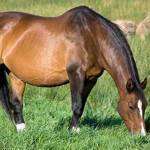Arabian Horse Mutation Linked to Cerebellar Abiotrophy

A genetic mutation discovered at the Veterinary Genetics Laboratory at UC-Davis is the cause of cerebellar abiotrophy, an untreatable neurologic disorder that mainly affects horses of Arabian breeding. Affected foals are born seemingly normal, but usually within a few weeks of birth, neurologic signs develop due to the loss of a certain type of neuron in the horse’s cerebellum. This area of the brain controls motor function, balance, and coordination. Affected horses do not lose muscle strength but do show a variety of neurologic deficits including severely impaired balance. Most are euthanized at an early age.
Cerebellar abiotrophy is a recessive trait, meaning that an affected foal must have two copies of the defective gene, one from each parent. Unaffected horses can have one copy and are thus carriers of the trait. The mating of two carriers could produce a foal with no copies, one copy (would not show neurologic deficits), or two copies.
A recently developed genetic test allows identification of horses that are affected or that carry the specific mutation. Ending the use of carriers for breeding could eliminate this defect in the Arabian breed.








